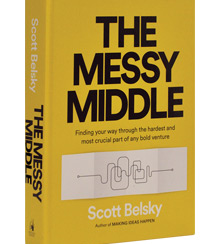Muddling Through
Scott Belsky’s new book offers inspiration to leaders slogging through the life span of a successful business.
The Messy Middle: Finding Your Way through the Hardest and Most Crucial Part of Any Bold Venture
by Scott Belsky, Portfolio, 2018
Books of advice on how to succeed in business often follow an arc that’s a lot like that of the Hollywood hero’s quest: There is a problem to be solved, he or she (usually he) faces trials and tribulations along the way, and ultimately there is a solution, which lies within the hero’s heart. And as is the case with movies, the quality of business success books is measured less by the novelty of the story they tell (it’s always the same story) than by how convincingly they tell it.
By that standard, Scott Belsky’s The Messy Middle is a real success. Entrepreneurs may not find the book full of striking revelations. But all readers are likely to leave it with a quick stride, a chin held high, and a renewed sense of vigor and commitment. The book offers a rewarding trip through Silicon Valley’s best ideas about business.
The Messy Middle is a distinctly Valley-ish book, infused with the values, the insights, and sometimes the prejudices of today’s tech industry. The messy middle, in business parlance, is the long stretch of time between the eureka moment of starting an enterprise and the hallelujah moment of selling or taking it public. Belsky’s own best-known entrepreneurial achievement is a company called Behance, a site on which creatives can upload and manage portfolios, which he sold to Adobe in 2012 for US$150 million. If you haven’t heard of Behance, that’s OK — the stories of building the company take up a substantial part of the book, but they do not exhaust Belsky’s bona fides. In addition to founding Behance and serving in his current role as Adobe’s chief product officer and executive vice president, Belsky was an angel investor in startups including Pinterest, Warby Parker, and Uber. He is cofounder and chairman of Prefer, a referral platform for independent professionals, and he continues to be an early-stage investor and advisor of startups in Silicon Valley.
Belsky’s advice unfolds through the Valley’s prism. There are specific tips about how to share recognition, how to conduct demonstrations, and how to create effective workspaces — in other words, he reviews the many details that have to be mastered in running a growing business. Mainly, however, this is really a story of business as a personal journey through the messy middle.
As in all hero quests, there is a triumph over adversity. Belsky credits a favorite advisor of his own with some of the most vividly expressed guidance in the book: “Starting a company is a roller-coaster of suffering. You need to be comfortable hearing no over and over.” This is unquestionably true, and Belsky raises the usual and useful caution flags, warning entrepreneurs to prepare for five years of difficulty before they can arrive at anything that might be called success.
“Starting a company is a roller-coaster of suffering. You need to be comfortable hearing no over and over.”
The suffering, of course, has a point. Or maybe better: Some of the suffering is the point. Although the book unfolds in anecdotes — what happened when a competitor introduced a simpler tool, how Belsky faced down a dozen executives at Adobe — its heart is really in the interior journey. In this sense, The Messy Middle is part of a long tradition of business advice books, from Dick Bolles’s What Color Is Your Parachute? to Sheryl Sandberg’s Lean In (and maybe stretching all the way back to Francis Bacon’s Essays), that argue that the way to succeed in work is to appreciate and marshal your inner resources.
If you divide business books between those that focus on management and those that center on personal growth, The Messy Middle falls squarely in the second camp. Belsky spends some time discussing how to maneuver your team through a big company. The core of the advice, though, is for companies that are in startup mode.
Indeed, it seems clear that the scrappy startup is where Belsky’s main interests and sympathies lie. When he starts writing about big companies, the narrative bogs down. When he discusses a meeting with Adobe executives, the stories tend to be about how his team got them to see the light. Big companies are referred to euphemistically as “heritage corporations.” It inevitably makes the reader think of “heritage turkeys,” and it doesn’t come off as a compliment.
Some of the specific advice here, such as how to build teams, how to keep top performers, and how to deal with conflict, is familiar, though certainly valid. Other elements are interesting and more debatable; for example, the recommendation to make room for “free radicals” — quirky top performers who don’t want to fit in — conflicts with the currently popular guidance to steer clear of talented jerks.
Ultimately, though, this book is less a collection of tips than a framework for inspiration. Belsky is aware of this — self-awareness is one of the qualities he values, and it shows — and he embraces it. “You are a storyteller,” he writes. “Your job is to make history more interesting and more relevant when retold than when it happened.”
That’s one of the soundest lessons of The Messy Middle. Whether or not entrepreneurs follow his advice about how to create a presentation or recognize their employees, the entire book makes for a useful model of how to tell the story of your business. Because stories, more than anything else, inspire loyalty. Starting a business is a long march through the dark, and to get through it, you need something to tell around the campfire.
Author profile:
- Mark Gimein is a managing editor at the Week, and writes regularly about economic issues.



